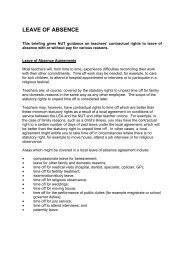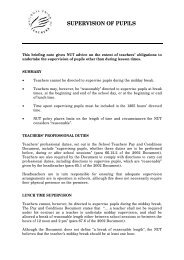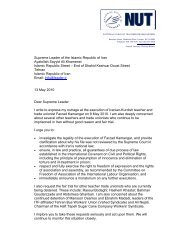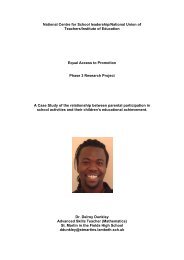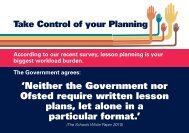Reducing Teachers' Workload â A Way Forward - National Union of ...
Reducing Teachers' Workload â A Way Forward - National Union of ...
Reducing Teachers' Workload â A Way Forward - National Union of ...
You also want an ePaper? Increase the reach of your titles
YUMPU automatically turns print PDFs into web optimized ePapers that Google loves.
hour <strong>of</strong> marking/preparation for one hour teaching [sic] would mean inevitable slippage from<br />
the position they had achieved. They may be right, but at what human cost ?<br />
<strong>Reducing</strong> workloads<br />
At this point in the discussions in each school, we were able to introduce the<br />
recommendations made in the Implementation Report, and ask for teachers’ views on them.<br />
First, however, we had to ask formally whether teachers considered their current working<br />
hours reasonable. Very few teachers we spoke to did. This is hardly surprising, given some<br />
<strong>of</strong> the workloads reported on page 9.<br />
Overall views on teachers’ hours<br />
What hours would teachers consider as reasonable ? Not surprisingly, answers varied<br />
between individuals; newer teachers, and those without family responsibilities, were <strong>of</strong>ten<br />
prepared to work more. But it should be firmly stated – though it will come as no surprise to<br />
those with knowledge <strong>of</strong> the pr<strong>of</strong>ession – that teachers do not expect, or even want, to work<br />
“school hours”. Most teachers, judging by our response, think it is reasonable to spend the<br />
equivalent <strong>of</strong>:<br />
• one extra hour in school per day, either before or after the children are present<br />
(depending on personal circumstances)<br />
• a further two hours in the evening marking and preparing, five nights per week<br />
(typically Sunday to Thursday)<br />
• one or two extra hours over the weekend, now and then, if there is something special<br />
to do.<br />
Depending on school timetables, they regard this as not an unreasonable voluntary workload<br />
(say 40 – 45 hours) by the standards <strong>of</strong> other pr<strong>of</strong>essionals.<br />
Limiting class contact hours<br />
Given the above workloads, what scope did teachers identify for limiting class contact<br />
hours ?<br />
As might be expected, the position was different between primary and secondary schools. All<br />
teachers would welcome some limit on class contact and most would want to see this<br />
reflected contractually. It was difficult however, to get all teachers to quantify what they<br />
would like, so that it could be compared with the Implementation Report’s recommendations.<br />
Primary school teachers, particularly those who received little or no release from classes at<br />
the moment, thought they deserved a minimum <strong>of</strong> one session per week for preparation<br />
within school time. This represents around 2_ hours in most schools, and is close to the<br />
corresponding Implementation Report recommendation. Moreover they were quite specific<br />
about how this would need to be implemented.<br />
NUT/ATL 11 <strong>Reducing</strong> Teacher’s <strong>Workload</strong>




